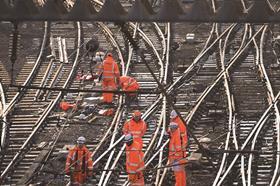Ministers set out efficiency and modernisation agenda around infrastructure delivery

Senior construction industry figures have given a mixed welcome to government plans to narrow the sector’s productivity gap and modernise its approach to delivering infrastructure projects.
The government laid out plans to address a £15bn productivity shortfall in Transforming Infrastructure Performance (TIP), a decade-long programme announced in London earlier today which aims to improve how infrastructure is designed, built and operated, leading – ministers hope – to better returns on investment.
The government also published its Transport Infrastructure Efficiency Strategy which sets out how lessons learned from TIP will be applied to drive efficiency and productivity in transport schemes.
Civil Engineering Contractors Association director of external affairs Marie-Claude Hemming warned that government still had to ”get spades in the ground” and ensure schemes are brought forward to market without delay, particularly in underperforming regions.
“If the government is to deliver strong post-Brexit growth, it is clear it must work with industry to tackle the skills shortages that are holding our economy back, and close the productivity gap for good,” she added.
But Jason Millett, chief operating officer at Mace, said the new policies showed the government was committed to working with the private sector to improve how it designed and delivered infrastructure. “Transforming our infrastructure delivery in the UK has the potential to radically improve our productivity and so deliver more sustainable growth for the economy as whole.”
Mark Farmer, chief executive of Cast and author of the ‘Modernise or Die’ report, agreed the announcement was positive for the industry.
“Without a concerted overhaul of the way we commission construction projects and in turn how we train a future proofed workforce, our industry will be unable to deliver large infrastructure projects such as HS2, Crossrail 2 and Hinkley Point or deliver the government’s housing ambitions.
“These projects are of paramount importance to improving the UK’s lacklustre productivity and unlocking wider economic growth,” he said.
David Whysall, head of infrastructure south & UK commercial services at Turner & Townsend, said there was now a clear efficiency agenda around transport projects, supported by all of the major infrastructure delivery operators. “Efficiency isn’t simply defined as slashing costs and driving down supply margins, but working together to achieve better performance throughout delivery and the whole life of assets, ultimately leading to better outcomes for customers.
“This relies on embracing a data and technological revolution, using benchmarks to understand and improve performance, and developing stronger, and more sustainable relationships through an integrated supply chain.”
























No comments yet